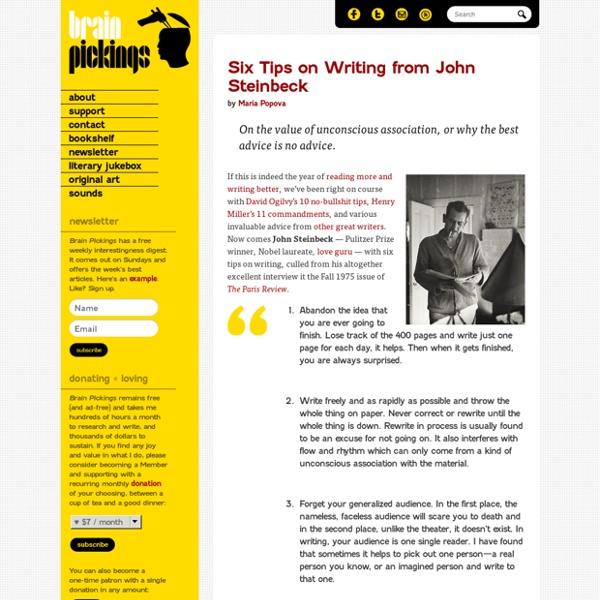



The Adverb Is Not Your Friend: Stephen King on Simplicity of Style by Maria Popova “I believe the road to hell is paved with adverbs, and I will shout it from the rooftops.” “Employ a simple and straightforward style,” Mark Twain instructed in the 18th of his 18 famous literary admonitions. Though he may have used a handful of well-placed adverbs in his recent eloquent case for gun control, King embarks upon a forceful crusade against this malignant part of speech: The adverb is not your friend.Adverbs … are words that modify verbs, adjectives, or other adverbs. King uses the admonition against adverbs as a springboard for a wider lens on good and bad writing, exploring the interplay of fear, timidity, and affectation: I’m convinced that fear is at the root of most bad writing. This latter part, touching on the contrast between intrinsic and extrinsic motivation, illustrates the critical difference between working for prestige and working for purpose. Donating = Loving Bringing you (ad-free) Brain Pickings takes hundreds of hours each month. Share on Tumblr
Stephen King's Top 20 Rules for Writers Image by the USO, via Flickr Commons In one of my favorite Stephen King interviews, for The Atlantic, he talks at length about the vital importance of a good opening line. “There are all sorts of theories,” he says, “it’s a tricky thing.” “But there’s one thing” he’s sure about: “An opening line should invite the reader to begin the story. We’ve talked so much about the reader, but you can’t forget that the opening line is important to the writer, too. This is excellent advice. Revision in the second draft, “one of them, anyway,” may “necessitate some big changes” says King in his 2000 memoir slash writing guide On Writing. 1. 2. 3. 4. 5. 6. 7. 8. 9. 10. 11. 12. 13. 14. 15. 16. 17. 18. 19. 20. See a fuller exposition of King’s writing wisdom at Barnes & Noble’s blog. Related Content: Stephen King Creates a List of 96 Books for Aspiring Writers to Read Stephen King Writes A Letter to His 16-Year-Old Self: “Stay Away from Recreational Drugs”
How to Write with Style: Kurt Vonnegut’s 8 Keys to the Power of the Written Word Find a Subject You Care About Find a subject you care about and which you in your heart feel others should care about. It is this genuine caring, and not your games with language, which will be the most compelling and seductive element in your style. I am not urging you to write a novel, by the way — although I would not be sorry if you wrote one, provided you genuinely cared about something. Do Not Ramble, Though I won’t ramble on about that. Keep It Simple As for your use of language: Remember that two great masters of language, William Shakespeare and James Joyce, wrote sentences which were almost childlike when their subjects were most profound. Simplicity of language is not only reputable, but perhaps even sacred. Have the Guts to Cut It may be that you, too, are capable of making necklaces for Cleopatra, so to speak. Sound like Yourself The writing style which is most natural for you is bound to echo the speech you heard when a child. Say What You Mean to Say Pity the Readers